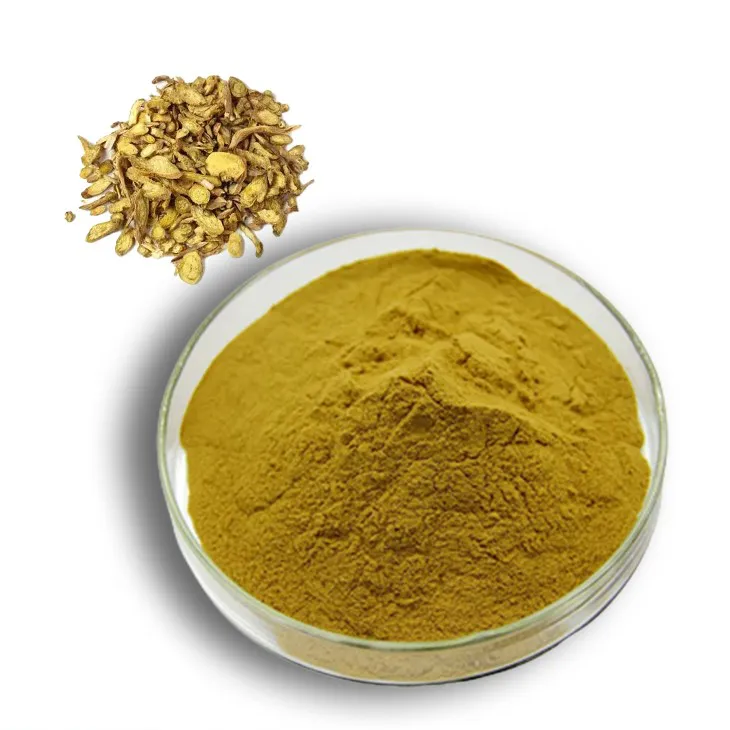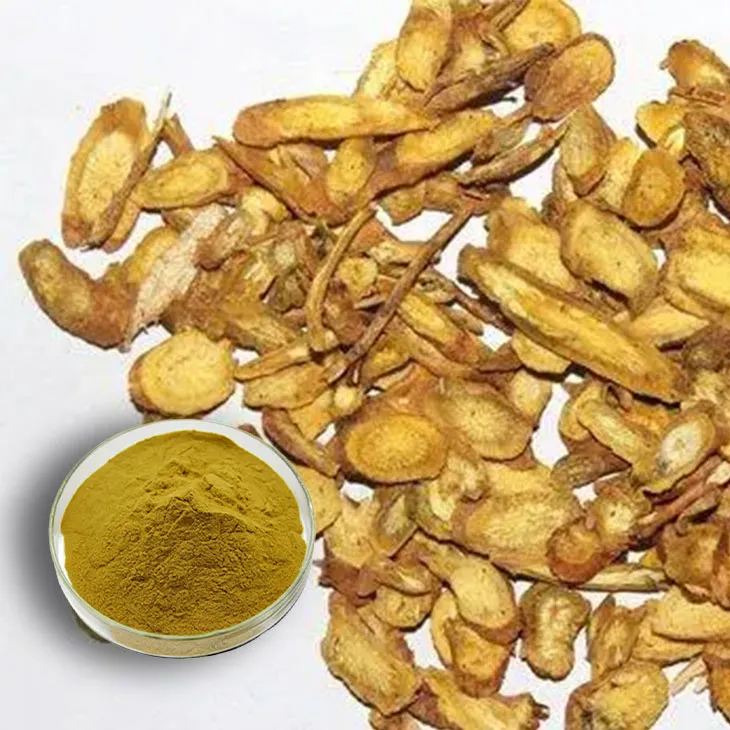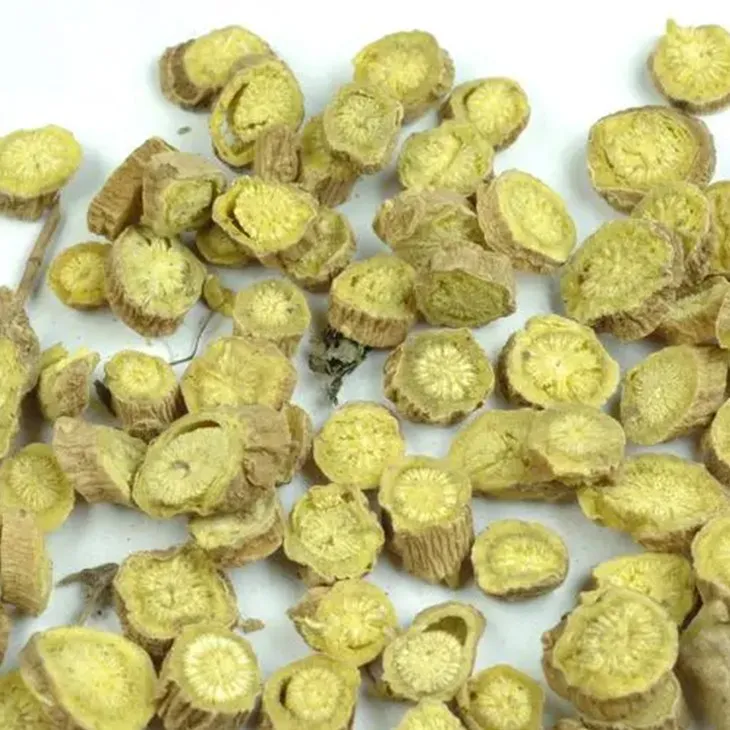- 0086-571-85302990
- sales@greenskybio.com
The Magic of Baicalin Powder: A Comprehensive Guide
2024-11-12

1. Introduction to Baicalin Powder
Baicalin powder is derived from the root of Scutellaria baicalensis Georgi, a plant that has been used in traditional Chinese medicine for centuries. Baicalin, the main active component in this powder, has a unique chemical structure. Its molecular formula is C₂₁H₁₈O₁₁, and it belongs to the flavonoid class of compounds. This unique structure endows baicalin with a variety of biological activities, making it a subject of great interest in modern research.

2. Biological Activities of Baicalin
2.1 Anti - inflammatory Activity
One of the most significant properties of baicalin is its anti - inflammatory effect. It can inhibit the production of pro - inflammatory cytokines such as interleukin - 1β (IL - 1β) and tumor necrosis factor - α (TNF - α). Inflammatory responses are involved in many diseases, and by suppressing these cytokines, baicalin can potentially reduce inflammation in the body. For example, in experimental models of arthritis, baicalin has been shown to reduce joint swelling and pain by modulating the inflammatory cascade.
2.2 Antioxidant Activity
Baicalin also exhibits strong antioxidant properties. It can scavenge free radicals, such as superoxide anions and hydroxyl radicals, which are highly reactive molecules that can cause damage to cells and tissues. By neutralizing these free radicals, baicalin helps protect cells from oxidative stress. This antioxidant activity is beneficial in preventing various diseases associated with oxidative damage, including cardiovascular diseases, neurodegenerative disorders, and certain types of cancer.
2.3 Antibacterial and Antifungal Activity
Studies have demonstrated that baicalin has antibacterial and antifungal capabilities. It can act against a wide range of pathogenic bacteria, including Staphylococcus aureus and Escherichia coli. The mechanism of its antibacterial action may involve disrupting the bacterial cell wall or interfering with bacterial protein synthesis. Similarly, baicalin has been shown to be effective against certain fungi, making it a potential candidate for the development of new antimicrobial agents.

3. Baicalin in Disease Treatment
3.1 Respiratory Diseases
In the treatment of respiratory diseases, baicalin has shown great promise. For instance, in cases of bronchitis and pneumonia, baicalin can help reduce inflammation in the airways, relieve cough, and improve breathing. It may also enhance the immune response in the respiratory tract, helping the body to fight off infections more effectively. Additionally, baicalin has been studied for its potential in treating asthma, as it can modulate the immune system and reduce airway hyper - responsiveness.
3.2 Gastrointestinal Disorders
For gastrointestinal disorders, baicalin can play multiple roles. It has been shown to protect the gastric mucosa from damage caused by factors such as alcohol and non - steroidal anti - inflammatory drugs (NSAIDs). In cases of ulcerative colitis, baicalin can reduce intestinal inflammation, promote the repair of damaged intestinal mucosa, and regulate the gut microbiota. This is important as an imbalance in the gut microbiota has been associated with various gastrointestinal diseases.
3.3 Cardiovascular Diseases
Baicalin may have beneficial effects on cardiovascular diseases. It can help lower blood pressure by relaxing blood vessels. Moreover, its antioxidant and anti - inflammatory properties can contribute to reducing the risk of atherosclerosis. Atherosclerosis is a major cause of heart attacks and strokes, and by preventing the formation of atherosclerotic plaques, baicalin may play a role in maintaining cardiovascular health.

4. Baicalin in the Beauty Industry
4.1 Skin Health
Baicalin has significant potential in promoting skin health. Its antioxidant activity helps protect the skin from damage caused by environmental factors such as ultraviolet (UV) radiation and pollution. It can also reduce inflammation in the skin, which is beneficial for conditions like acne, eczema, and psoriasis. Moreover, baicalin may stimulate collagen synthesis, which is essential for maintaining skin elasticity and reducing the appearance of wrinkles.
4.2 Hair Care
In the field of hair care, baicalin can potentially improve hair health. It may help strengthen hair follicles, reduce hair loss, and promote hair growth. This is likely due to its ability to improve blood circulation in the scalp and its antioxidant and anti - inflammatory effects on the hair follicles.

5. Incorporating Baicalin into Different Fields
5.1 Pharmaceutical Industry
Baicalin has great potential in the pharmaceutical industry. It can be used as an active ingredient in the development of new drugs for various diseases. Pharmaceutical companies are exploring ways to optimize the formulation of baicalin - based drugs to improve their bioavailability and efficacy. For example, by developing new drug delivery systems, such as nanoparticles or liposomes, to enhance the delivery of baicalin to target tissues.
5.2 Cosmetic Industry
The cosmetic industry has also recognized the value of baicalin. It is being incorporated into a variety of skin care and hair care products. Baicalin - containing creams, lotions, and serums are becoming popular for their skin - beautifying and anti - aging properties. In hair products, shampoos and conditioners with baicalin are being developed to improve hair quality.
5.3 Nutraceutical Industry
In the nutraceutical industry, baicalin can be used as a dietary supplement. It can be formulated into capsules, tablets, or powders for consumers who are interested in its health - promoting benefits. However, it is important to ensure the safety and quality of baicalin - based nutraceutical products through proper manufacturing processes and regulatory compliance.
6. Safety and Precautions
While baicalin has many potential benefits, it is also important to consider safety and precautions. In general, baicalin is considered safe when used within the recommended dosage. However, some individuals may experience allergic reactions to baicalin. Pregnant and breastfeeding women should consult their healthcare providers before using baicalin - containing products, as its safety in these populations has not been fully established. Additionally, when using baicalin in combination with other medications, there may be potential drug - drug interactions, so it is advisable to seek medical advice.
7. Conclusion
Baicalin powder truly holds a certain "magic" with its diverse biological activities and potential applications in various fields. From disease treatment to the beauty industry and beyond, baicalin has the potential to make a significant impact. However, further research is still needed to fully understand its mechanisms of action, optimize its use, and ensure its safety. As scientific research continues to unfold, we can expect to see more exciting developments regarding baicalin powder in the future.
FAQ:
What is the chemical structure of baicalin?
Baicalin is a flavonoid glycoside. Its chemical structure consists of a flavone aglycone, baicalein, linked to a glucose and a rhamnose molecule. This unique structure is responsible for its various biological activities.
How does baicalin powder contribute to treating diseases?
Baicalin powder has anti - inflammatory, antioxidant, antibacterial, and antiviral properties. For example, in inflammation - related diseases, it can inhibit the production of inflammatory factors. In infectious diseases, its antibacterial and antiviral abilities can help fight against pathogens, thus contributing to the treatment of various diseases.
What potential does baicalin powder have in the beauty industry?
Baicalin powder has great potential in the beauty industry. Due to its antioxidant property, it can help fight free radicals in the skin, which are associated with skin aging. It may also have anti - inflammatory effects on the skin, which can be beneficial for treating skin conditions like acne and eczema, and generally improving skin health.
How can baicalin powder be used in different fields?
In the pharmaceutical field, it can be used as an ingredient in drugs for treating various diseases. In the cosmetics field, it can be added to skincare products. In the food industry, it may be explored as a functional ingredient for health - promoting products, given its various beneficial biological activities.
Are there any side effects of using baicalin powder?
While baicalin powder generally has many beneficial effects, in some cases, it may cause allergic reactions in certain individuals. Also, high - dose or long - term use may have some unanticipated effects, although more research is needed to fully understand its potential adverse effects.
Related literature
- The Pharmacological Properties of Baicalin: A Review"
- "Baicalin in Skin Health and Cosmetics: Recent Advances"
- "Baicalin and Its Role in Disease Treatment: An Overview"
- ▶ Hesperidin
- ▶ Citrus Bioflavonoids
- ▶ Plant Extract
- ▶ lycopene
- ▶ Diosmin
- ▶ Grape seed extract
- ▶ Sea buckthorn Juice Powder
- ▶ Fruit Juice Powder
- ▶ Hops Extract
- ▶ Artichoke Extract
- ▶ Mushroom extract
- ▶ Astaxanthin
- ▶ Green Tea Extract
- ▶ Curcumin
- ▶ Horse Chestnut Extract
- ▶ Other Product
- ▶ Boswellia Serrata Extract
- ▶ Resveratrol
- ▶ Marigold Extract
- ▶ Grape Leaf Extract
- ▶ New Product
- ▶ Aminolevulinic acid
- ▶ Cranberry Extract
- ▶ Red Yeast Rice
- ▶ Red Wine Extract
-
Diosmin
2024-11-12
-
Lavender Extract
2024-11-12
-
Tamarind extract powder
2024-11-12
-
melatonin extract
2024-11-12
-
Curcuma Longa Extract/Turmeric extract
2024-11-12
-
Natural grape seed extract
2024-11-12
-
Beta Carotene
2024-11-12
-
Lemon Juice Powder
2024-11-12
-
White Peony Extract
2024-11-12
-
Tongkat Ali Extract
2024-11-12





















